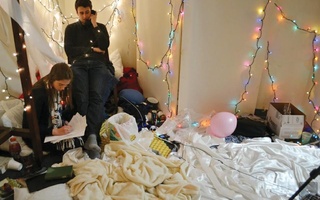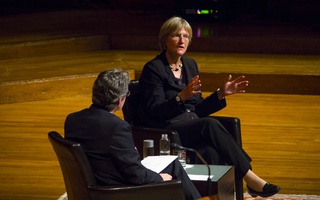Researchers at the Harvard Kennedy School praised the efficacy of the response by medical and law enforcement officials to the Boston Marathon bombings in a paper published last week by the school’s Program on Crisis Leadership.
Faculty co-directors of the program Herman Dutch B. Leonard and Arnold M. Howitt commended the skilled and immediate responses from medical teams to treat victims of the bombings, which killed three and injured more than 170 at the finish line of one of Boston’s most celebrated annual sporting events. They identified nine factors contributing to the effectiveness of the medical response, including the locally situated personnel and high concentration of medical facilities in the city.
“A key feature of the response was that no one had to try to command it,” said Leonard. “The response unfolded by each of the people involved doing what they could see needed to be done.”
The paper also described how the involvement of federal, state, and local law enforcement agencies provided for an “extraordinary level of law enforcement cooperation,” according to Howitt.
The researchers highlighted that press releases by various officials throughout the week kept the public sufficiently informed and were particularly helpful in the process of identifying the suspects. Complete prevention of events such as the bombings, the paper suggested, is impossible. In fact, the researchers said that marathons are more susceptible to a terrorist attack than many other sporting events.
“Many sporting events take place in fixed venues around which a perimeter is placed to limit entry,” but “marathons have a roughly 55 mile perimeter, virtually none of which can be engineered to reliably limit access,” the paper read.
Leonard also cautioned against focusing too heavily on how this specific instance could have been prevented. “We need to be just as aware of the other possible kinds of threats,” he said.
In discussing continued research into the events, Leonard mentioned the citywide lockdown and the nature of the devices used in the attack as two of many topics to investigate.
He emphasized the importance of thoroughly analyzing tragedies in order to learn information “that will really help us in the future to minimize damage.” Citing improvement in crisis response over the last ten years, he added that he was hopeful research conducted now could be useful later.
“We need to keep working on it, but we need to recognize that we’ve already made some important progress,” Leonard said.
Read more in University News
Suggestions for the New Honor CodeRecommended Articles
-
Gossip GuyIt’s time for FM to air its dirty laundry, so sit back, relax and enjoy our socially awkward lies, maladjusted
-
Tsunami Spurs Student to ActionKelsey T. Leonard ’10 was on her way to work Tuesday when she learned, in a text message from her ...
-
 Student Art Group Dials In World's Longest Phone Call
Student Art Group Dials In World's Longest Phone Call -
Generalist Makes Participants PerformersThe Harvard Generalist, a new arts collective on campus, aims to challenge traditional performance styles with its installations.
-
 Faust Charts Course Through ‘Stormy Seas’ as The Harvard Campaign Approaches
Faust Charts Course Through ‘Stormy Seas’ as The Harvard Campaign Approaches -
Love it: Half MarathonsI started out by running 1/26th marathons in high school gym class. As fulfilling as those 3.5 laps around the track were as I overlapped an old woman doing walking arm workouts, saying “I just ran a 1/26th marathon” didn’t have the right ring to it. I wanted to run something that sounded impressive.













